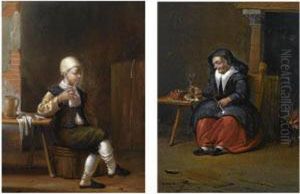Francois Paludanus Paintings
Francois Paludanus, or sometimes known in Dutch as Franciscus Paludanus or in English as Francis Paludanus, was not primarily known as an artist, but rather as a collector, physician, and an expert in natural history during the late Renaissance period. Born in 1550 in Berkenrode, near Haarlem, in the Netherlands, he was part of the intellectual movement that characterized the era, with a strong interest in the natural world, ethnography, and the collection of exotic artifacts.
Although there is not much information available on the details of his early life and education, it is known that Paludanus became a well-traveled scholar and gathered a significant collection of natural specimens, coins, ethnographic artifacts, and other curiosities from around the world. His collection became known as the 'Cabinet of Curiosities', which was a precursor to the modern museum and included items from Asia, the Americas, Africa, and other parts of Europe.
Paludanus was also known for his work in botany and pharmacology. He contributed to the field of medicine through his knowledge of plants and their medicinal properties. This was a common practice among physicians of the time, who were often deeply involved in natural sciences and relied on a wide variety of plants and minerals to concoct remedies.
He died in 1633 in Enkhuizen, in the Netherlands. After his death, part of his extensive collection was purchased by the Swedish king, Gustavus Adolphus, which later became the basis for the Royal Cabinet of Curiosities in Sweden, one of the oldest museums in the country. While Francois Paludanus may not have been an artist in the traditional sense, his work as a collector and natural historian contributed significantly to the preservation and dissemination of knowledge about the natural world and other cultures during the Renaissance. His legacy is reflective of the curiosity and the spirit of inquiry that characterized the scholarship of his time.
